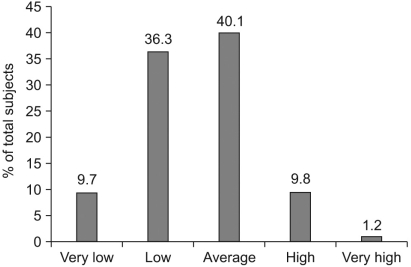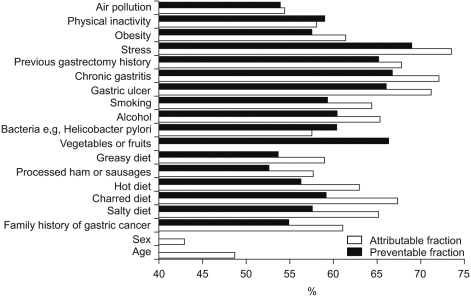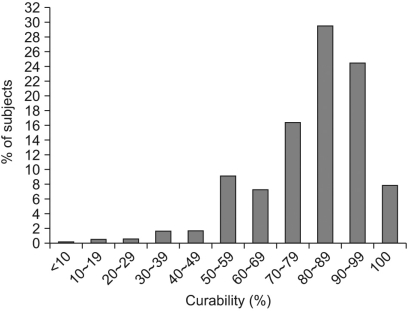Cancer Res Treat.
2009 Jun;41(2):59-66.
Public Awareness of Gastric Cancer Risk Factors and Disease Screening in a High Risk Region: A Population-Based Study
- Affiliations
-
- 1Department of Internal Medicine, Seoul National University Hospital, Seoul, Korea. ohdoyoun@snu.ac.kr
- 2Cancer Research Institute, Seoul National University College of Medicine, Seoul, Korea.
- 3Cancer Prevention and Early Detection Branch, National Cancer Center, Goyang, Korea.
Abstract
- PURPOSE
This study involved a population-based survey to provide evidence of public awareness of risk factors of gastric cancer and to investigate attitudes for the screening of gastric cancer in the South Korean population. MATERIALS AND METHODS: Using a nationwide random selection method, 2014 subjects were enrolled in the study between 5 September 2006 and 25 September 2006. RESULTS: In terms of the awareness of risk factors, awareness was scored as the percentage of the probability of developing gastric cancer when a subject had a particular risk factor. For the risk factors, stress ranked highest with a score of 73.5%, followed by chronic gastritis (score of 72.1%), gastric ulcer (score of 71.2%) and a previous gastrectomy history (score of 68.7%). Other factors included a diet of charred foods (score of 67.3%), alcohol use (score of 65.3%), salty diet (score of 65.1%), history of smoking (score of 64.3%) and Helicobacter pylori infection (score of 57.5%). Subjects believed that 60.4% of all gastric cancers were preventable by lifestyle modification and the subjects believed that regular screening could prevent 72.1% of all gastric cancers. However, 54% of subjects did not receive regular screening and the most common reason for not undergoing screening was a lack of symptoms. CONCLUSION: Public education about the risk factors of gastric cancer and of lifestyle modifications and the importance of regular screening regardless of the presence of symptoms should be emphasized to reduce gastric cancer mortality in South Korea.
Keyword
MeSH Terms
Figure
Reference
-
1. Parkin DM, Bray F, Ferlay J, Pisani P. Global cancer statistics, 2002. CA Cancer J Clin. 2005; 55:74–108. PMID: 15761078.
Article2. Crew KD, Neugut AI. Epidemiology of gastric cancer. World J Gastroenterol. 2006; 12:354–362. PMID: 16489633.
Article3. Forman D, Burley VJ. Gastric cancer: global pattern of the disease and an overview of environmental risk factors. Best Pract Res Clin Gastroenterol. 2006; 20:633–649. PMID: 16997150.
Article4. Shikata K, Kiyohara Y, Kubo M, Yonemoto K, Ninomiya T, Shirota T, et al. A prospective study of dietary salt intake and gastric cancer incidence in a defined Japanese population: the Hisayama study. Int J Cancer. 2006; 119:196–201. PMID: 16450397.
Article5. Gwack J, Shin A, Kim CS, Ko KP, Kim Y, Jun JK, et al. CagA-producing Helicobacter pylori and increased risk of gastric cancer: a nested case-control study in Korea. Br J Cancer. 2006; 95:639–641. PMID: 16909137.
Article6. Keighley MR, O'Morain C, Giacosa A, Ashorn M, Burroughs A, Crespi M, et al. Public awareness of risk factors and screening for colorectal cancer in Europe. Eur J Cancer Prev. 2004; 13:257–262. PMID: 15554552.
Article7. Pohls UG, Renner SP, Fasching PA, Lux MP, Kreis H, Ackermann S, et al. Awareness of breast cancer incidence and risk factors among healthy women. Eur J Cancer Prev. 2004; 13:249–256. PMID: 15554551.8. Peacey V, Steptoe A, Davidsdottir S, Baban A, Wardle J. Low levels of breast cancer risk awareness in young women: an international survey. Eur J Cancer. 2006; 42:2585–2589. PMID: 16829071.
Article9. Powe BD, Finnie R, Ko J. Enhancing knowledge of colorectal cancer among African Americans: why are we waiting until age 50? Gastroenterol Nurs. 2006; 29:42–49. PMID: 16552299.10. Ackermann S, Renner SP, Fasching PA, Poehls U, Bender HG, Beckmann MW. Awareness of general and personal risk factors for uterine cancer among healthy women. Eur J Cancer Prev. 2005; 14:519–524. PMID: 16284496.
Article11. McMenamin M, Barry H, Lennon AM, Purcell H, Baum M, Keegan D, et al. A survey of breast cancer awareness and knowledge in a Western population: lots of light but little illumination. Eur J Cancer. 2005; 41:393–397. PMID: 15691638.
Article12. Adami HO, Day NE, Trichopoulos D, Willett WC. Primary and secondary prevention in the reduction of cancer morbidity and mortality. Eur J Cancer. 2001; 37(Suppl 8):S118–S127. PMID: 11602378.
Article13. Salant T, Ganschow PS, Olopade OI, Lauderdale DS. "Why take it if you don't have anything?" Breast cancer risk perceptions and prevention choices at a public hospital. J Gen Intern Med. 2006; 21:779–785. PMID: 16808782.
Article14. Sabates R, Feinstein L. The role of education in the uptake of preventative health care: the case of cervical screening in Britain. Soc Sci Med. 2006; 62:2998–3010. PMID: 16403597.
Article15. Wee CC, McCarthy EP, Phillips RS. Factors associated with colon cancer screening: the role of patient factors and physician counseling. Prev Med. 2005; 41:23–29. PMID: 15916989.
Article16. Macrae FA, Hill DJ, St John DJ, Ambikapathy A, Garner JF. Predicting colon cancer screening behavior from health beliefs. Prev Med. 1984; 13:115–126. PMID: 6718327.
Article17. Keighley MR, O'Morain C, Giacosa A, Ashorn M, Burroughs A, Crespi M, et al. Public awareness of risk factors and screening for colorectal cancer in Europe. Eur J Cancer Prev. 2004; 13:257–262. PMID: 15554552.
Article18. Larsson SC, Bergkvist L, Wolk A. Fruit and vegetable consumption and incidence of gastric cancer: a prospective study. Cancer Epidemiol Biomarkers Prev. 2006; 15:1998–2001. PMID: 17035412.
Article19. Gajalakshmi CK, Shanta V. Lifestyle and risk of stomach cancer: a hospital-based case-control study. Int J Epidemiol. 1996; 25:1146–1153. PMID: 9027518.
Article20. Lillberg K, Verkasalo PK, Kaprio J, Teppo L, Helenius H, Koskenvuo M. Stressful life events and risk of breast cancer in 10,808 women: a cohort study. Am J Epidemiol. 2003; 157:415–423. PMID: 12615606.21. Lillberg K, Verkasalo PK, Kaprio J, Teppo L, Helenius H, Koskenvuo M. Stress of daily activities and risk of breast cancer: a prospective cohort study in Finland. Int J Cancer. 2001; 91:888–893. PMID: 11275996.
Article22. Duijts SF, Zeegers MP, Borne BV. The association between stressful life events and breast cancer risk: a meta-analysis. Int J Cancer. 2003; 107:1023–1029. PMID: 14601065.
Article23. Nielsen NR, Gronbaek M. Stress and breast cancer: a systematic update on the current knowledge. Nat Clin Pract Oncol. 2006; 3:612–620. PMID: 17080179.
Article




